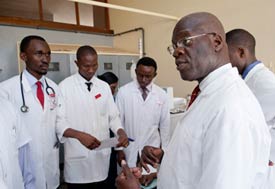Partnering with African scientists to improve global health
July 31, 2014

Photo by Richard Lord for Fogarty/NIH
The tremendous revitalization of African medical
education is encouraging, occurring partly as a
result of the Medical Education Partnership
Initiative (MEPI).
Opinion by Fogarty Director Dr Roger I Glass
As we prepare to welcome attendees to Washington for the first-ever U.S.-Africa Leaders Summit, we at Fogarty and NIH are excited to explore new collaborations that could improve health, strengthen research capacity and spur economic development across the African continent.
Together, we have made great progress over the past three decades in combating HIV/AIDS, malaria, TB and other infectious diseases. More recently, we've begun to study how to address the rising tide of noncommunicable diseases striking Africa as its population ages. I am truly excited at the possibility that our discussions during this summit will spur more cutting-edge health innovations and fruitful partnerships.
The summit's theme, "Investing in the Next Generation," resonates strongly with us, as our main focus is to train global leaders to tackle the complex health problems in Africa and elsewhere.
We are encouraged by the tremendous revitalization of African medical education, occurring partly as a result of our Medical Education Partnership Initiative (MEPI), funded by the President's Emergency Plan for AIDS Relief (PEPFAR) and NIH. With MEPI support, African medical schools are dramatically increasing enrollment, broadening curricula, upgrading Internet access and providing cutting-edge skills labs and other technologies. Where students used to fight to use shared text books, they are now each issued with notebook computers loaded with the latest instructional materials and equipped to access current journal articles. The pace of change is astonishing and we hope will result in sustainable health improvements for all Africans.

Meanwhile, Fogarty's Global Health Program for Fellows and Scholars also plays a key role in bringing about health advancements on the African continent. More than 500 Fogarty Fellows and Scholars have been supported on one-year mentored clinical research experiences at research sites in a number of African nations. Participants have pursued a variety of projects including studying surgical capacity in Rwanda, pediatric cardiology in Malawi and cervical cancer in Zambia. Many have remained engaged in research areas important to their host countries long after the fellowships have ended and continue to share their expertise from afar.
Through Fogarty's AIDS International Research and Training Program (AITRP), we've helped produce a cadre of well-qualified HIV/AIDS researchers and clinicians in 18 African countries. They've become equal partners, working in collaboration with American scientists and others around the globe, studying the most promising interventions and how best to implement them effectively in low-resource settings. In fact, NIH-funded studies have laid the groundwork for combating the HIV/AIDS epidemic through scientific discoveries made with African partners that show antiretroviral drug adherence is possible, male circumcision helps limit the spread of disease, treatment as prevention is effective, and other important advances.
Humans evolved in Africa and, today, populations in Africa carry the world's richest genetic diversity. However, the field of genomics has barely touched the continent, concentrating instead on developed countries with their ready supply of scientists, sophisticated equipment and study populations. It's heartening to see that this is now changing, thanks in large part to the efforts of the NIH and Wellcome Trust to establish H3Africa - the Human Heredity and Health in Africa Consortium. This bold initiative is developing genomics-related research expertise and infrastructure across Africa. Deepening the understanding of genomic variations in its many populations promises to improve health by enabling more accurate disease identification and diagnosis and - as the world moves toward personalized medicine - tailored treatments based on an individual's genomic profile.
Finally, as bandwidth expands across Africa, it's vital we take advantage of the opportunities for online research collaborations, distance learning, mobile apps for data collection and analysis, telemedicine and other approaches that have the potential to revolutionize how we conduct research and training in low-resource settings. This dovetails nicely with ongoing NIH efforts in the region. Through Fogarty's new mHealth and eCapacity programs, we'll provide a catalyst for our African grantees to explore how information and communication technology (ICT) can be employed to drive innovation and incorporated into novel research education tools.
By working together with our African partners, we hope to strengthen our research collaborations and make new discoveries that will advance health for all.
More Information
To view Adobe PDF files,
download current, free accessible plug-ins from Adobe's website.